 (281) 587-1111
(281) 587-1111  (281) 587-1111
(281) 587-1111 Traumatic Brain injuries can be one of the more difficult cases to present to a jury simply because a traumatic brain injury can’t be easily visualized. Fortunately, Our top-rated Houston brain injury lawyers have developed winning strategies for brain injury lawsuits over three decades.
We have won millions in compensation for brain injury victims and injured victims of car accidents, truck accidents, motorcycle injuries, wrongful death cases, burn accidents, and more. Talk with an award-winning brain injury attorney in Houston at Baumgartner Law Firm. Never a charge for an injury case consultation.
Call our Houston brain injury lawyer for a FREE CONSULTATION. Baumgartner Law Firm has handled many traumatic brain injury cases and won millions for our clients.
Our Top-Rated Houston Brain Injury Lawyer has been trusted to get maximum compensation for victims for over 35 years!
and discuss your case with Houston’s leading brain injury lawyer.

Serious head injuries are catastrophic, and recovery can be long and costly. Brain injuries affect everybody in a family.
Victims may have physical functions, speech, vision, memory, behavior, and personality problems. There are deadlines, called the statute of limitations, on filing claims. Therefore, you should speak with an experienced, dedicated head injury attorney in Houston as soon as possible.
Our brain injury lawyers have over 35 years of experience maximizing damages on traumatic brain injury Texas cases.
For further information or to arrange a free case evaluation, call (281) 587-1111 or contact us online.
The key to a successful brain injury lawsuit is hiring a knowledgeable closed head injury attorney who is experienced in handling serious and traumatic brain injury lawsuits. The earlier in the process, you seek out the best brain injury lawyer near me for your case, the better.
The Houston injury lawyers at Baumgartner Law Firm have been winning brain injury accident cases for over three decades. If you were injured in Texas and need a Houston brain injury lawyer with 35 years of experience with closed head injury lawsuits, we are here to help.
Call a Houston traumatic brain injury attorney to learn your rights and options.
The most common causes of traumatic brain injury cases our personal injury attorneys in Houston see are the following:
Anytime sudden trauma enters the equation, head injury is a possibility. If from a car accident or other incident. Traumatic brain injury cases require expertise. Looking for a traumatic brain injury lawyer near me? That is where we come in! Our traumatic brain injury attorney has won many brain injury cases with huge financial compensation for our clients.
Over 2 million people seek emergency medical treatment due to head injuries. These injuries frequently cause disabilities and fatalities. More than 380,000 Texans sustain a traumatic brain injury (TBI) each year, many caused by vehicle crashes. Head trauma can be brief or have lifelong consequences, affecting physical, emotional, or cognitive abilities.
Oxygen deprivation can cause permanent disability. We fight for more than pain and suffering. Our traumatic brain injury lawyer has won millions for closed head injury victims.
If you or a loved one suffered a head injury because of the negligence of another, contacting a traumatic brain injury law firm like Baumgartner Law Firm in Houston, TX, is a vital first step. Our injury lawyers in Houston have won many brain injury cases. Call a Houston brain injury attorney for a free case evaluation.
A head injury is a “trauma to the scalp, skull, or brain.” When it affects the brain, they’re called a traumatic brain injury, or TBI. Head trauma is classified according to the type of injury, its severity, and what parts of the head and brain are affected. The brain controls vital processes like breathing and cognitive and emotional reactions. Our brain injury lawyers are experienced in telling the story of a personal injury victim with a brain injury. Our traumatic brain injury attorneys have represented personal injury victims after severe accidents for over 35 years.
The skull is a framework of bone. It functions to cradle the delicate brain. Head injuries may be closed or open. If something strikes your head, but the impact force does not fracture the skull, it is a closed head injury. When the object breaks the skull, it is an open head injury.
Head injury may also be categorized based on the nature of the damage. Primary lesions directly result from an initial injury to the head, such as a hit on the head or the brain slamming into the inside of the skull. A secondary injury occurs when complications from the primary injury occur, such as insufficient blood flow to the brain.
If you suspect loss of consciousness from a car accident, you should always mention that to the emergency personnel and get examined by a doctor. Getting legal counsel from the best brain injury attorney in Houston is also advised.
Brain injuries may be open or closed injuries. Open head injuries result in a puncture wound or skull break. A closed head injury occurs when the skull is not broken or punctured, but the brain is otherwise damaged. An example is a concussion, where the brain strikes the inside of the skull.
Both types of brain injury can be severe to life-threatening. All minor, moderate, and severe head injuries bring the possibility of expensive medical care. Brain injury patients may also be unable to work for some time due to the injury, which puts additional strain on finances. Consulting a traumatic brain injury attorney in Houston, TX, is a vital first step to protecting your rights.
However, you have options when you or a loved one has suffered a severe brain injury another party caused. Our experienced personal injury lawyers can help you explore your options and collect the right evidence to establish your case.

One must be especially careful when a closed head or traumatic brain injury is suspected. Symptoms may not show up immediately after the accident. Often, symptoms show up only after an hour or even days after the event. Our traumatic brain injury law firm has helped many head injury victims get maximum compensation.
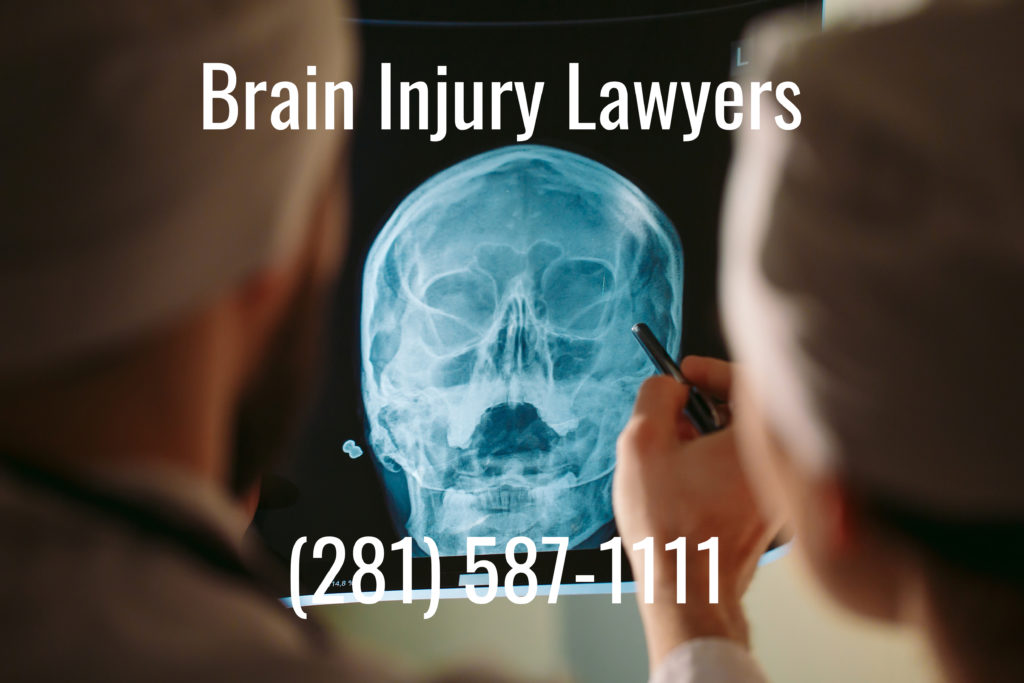
Because of the dangers inherent in traumatic brain injuries, getting medical help after a sharp blow to the head is always recommended. Numerous tests can be performed to help diagnose a traumatic brain injury (TBI). These tests include a CT scan, speech pathology, neuropsychological tests, and others.
Here are some of the classic symptoms of a brain injury that our injury lawyers in Houston frequently see:
Traumatic brain injuries are diagnosed with the Glasgow Coma Scale (GCS). The GCS is an objective measure of a person’s functioning ability in three areas:
Medical professionals rate a person’s responses in these three categories and develop a total score. A score of 13 or higher usually means a mild traumatic brain injury. A score of nine up to 12 indicates a moderate brain injury caused by the event. Eight and below show a severe head injury.
Usually, the Glasgow scale is completed on the way to the hospital after an accident. The testing will be repeated throughout a person’s hospital stay. Medical authorities indicate there may not be a correlation between Glasgow, scales, and a person’s ability to recover.
Other diagnostic tests may include a brain scan, X-rays, computed tomography (CAT scan), Electroencephalogram (EEG), magnetic resonance imaging (MRI), and blood work.
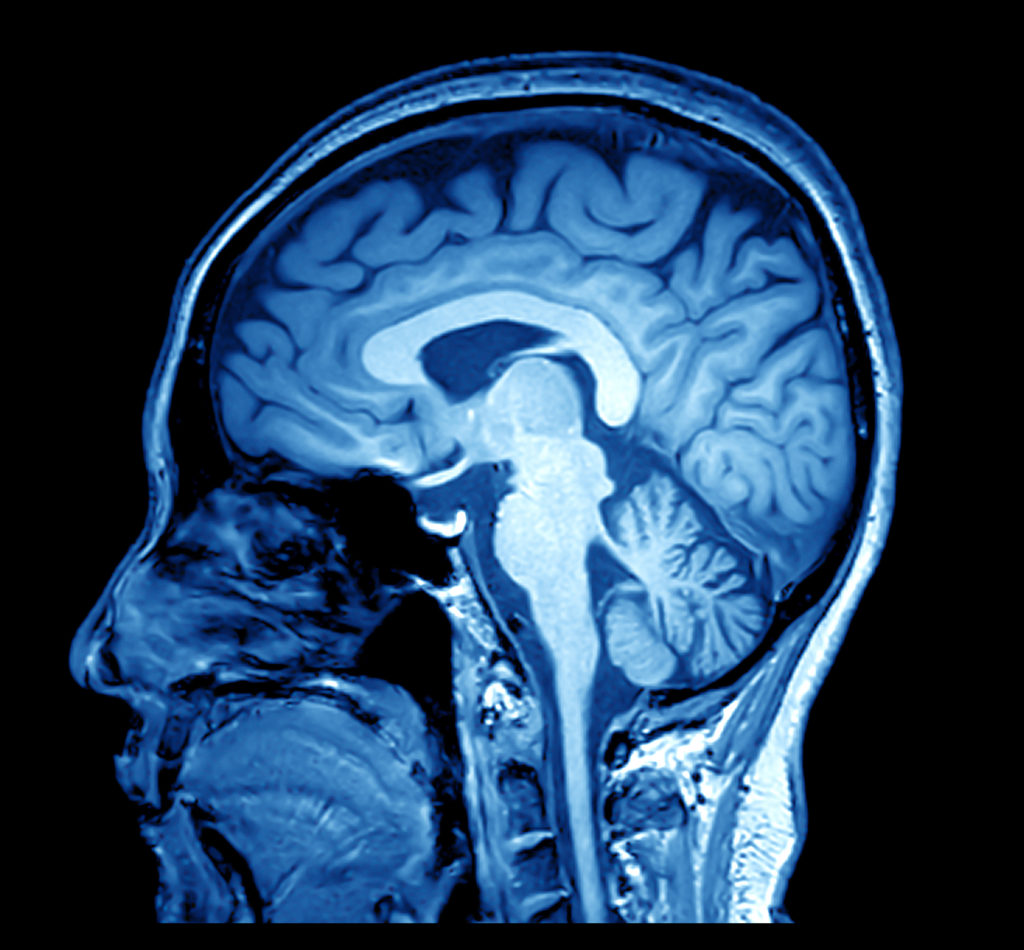
If you or a loved one suffered a head injury, talk about the injury and accident with a brain injury lawyer in Texas. A traumatic brain injury attorney can help guide you through the legal process. Fortunately, Houston, Texas, has world-class facilities for caring for people who have suffered a brain injury. Consult with Houston brain injury attorneys as soon as you can.
According to Brainline, an organization that works to prevent, treat, and aid those who have suffered from a traumatic brain injury (TBI), a concussion can be defined as “a result of a blow or jolt to the head that disrupts the normal function of the brain.”
While most individuals might chalk up any head injury as “not being too serious,” the research indicates that even the most minor concussions can have a wide range of psychological or physical effects. Our traumatic brain injury lawyers have over 35 years of experience representing brain injury victims, including concussions.
The research also notes that while many signs and symptoms of a serious issue can arise just minutes after a traumatic head injury, other signs may take days or weeks to develop. Thus, one must recognize the symptoms of a concussion to prevent ongoing or additional trauma to the injured individual.
Thus, remember the following concussion symptoms, broken down by subset:
Emotional and Cognition
Physical Attributes
For young children, one should follow:
If you notice someone with the above symptoms after a head injury, the first thing to do is to remain calm. Panicking worsens the situation by not fully understanding the condition and being unable to render aid or seek help. Getting the best brain injury lawyer with expertise in serious brain injuries gives your case the best chance to prevail with your brain injury claim.
Call our Houston brain injury lawyers for a FREE CONSULTATION. We have won many TBI cases and collected millions for our clients.
Our Houston brain injury attorneys are experienced in winning big damages for our clients. One of the keys for personal injury attorneys in Houston to recover compensation for damages related to a head injury is having qualified experts who can provide testimony about your case. An expert’s opinion and testimony can make the case. Our experienced TBI lawyers will seek out physicians with whom consultation and treatment will likely be needed.
These experts may include professionals with knowledge of:
Our head trauma lawyers have helped many clients with moderate to severe head injuries resulting in significant damage settlements. Call our Houston brain injury law firm for a consultation about your rights and options. We handle brain injury cases in Houston and across Texas.
After the injury, medical personnel will initially check your vital signs, confirm that you are conscious and responsive, and, if possible, ask about your symptoms. Once released, the doctor may ask that a responsible adult monitor your condition for a day or two. This person will be instructed about possible danger signs.
Your doctor may recommend a mild painkiller or a stronger one if necessary. Always follow the doctor’s recommendations, as certain drugs might increase the risk of bleeding inside the head.
In more severe cases, the doctor may admit the injured person to the intensive care unit, perform surgery to repair a depressed skull fracture or treat a brain hemorrhage. Long-term, a patient may need ongoing physical, psychological, or occupational therapy to deal with the consequences of their injury.
Our experienced brain injury lawyer may call these treating physicians to testify about the injuries, diagnosis, and impact of the injury on the victim’s life. As well as analyze the medical records and the cost of care in the past and going forward. Do not take a chance with your brain injury claim. Get an experienced personal injury lawyer for any severe traumatic brain injuries.
If you or your loved one has suffered a brain injury due to another party’s negligence, you can seek compensation for the damages. In this type of case, accident victims and their families might suffer various damages. A traumatic brain injury lawyer can help you with the brain injury claim.
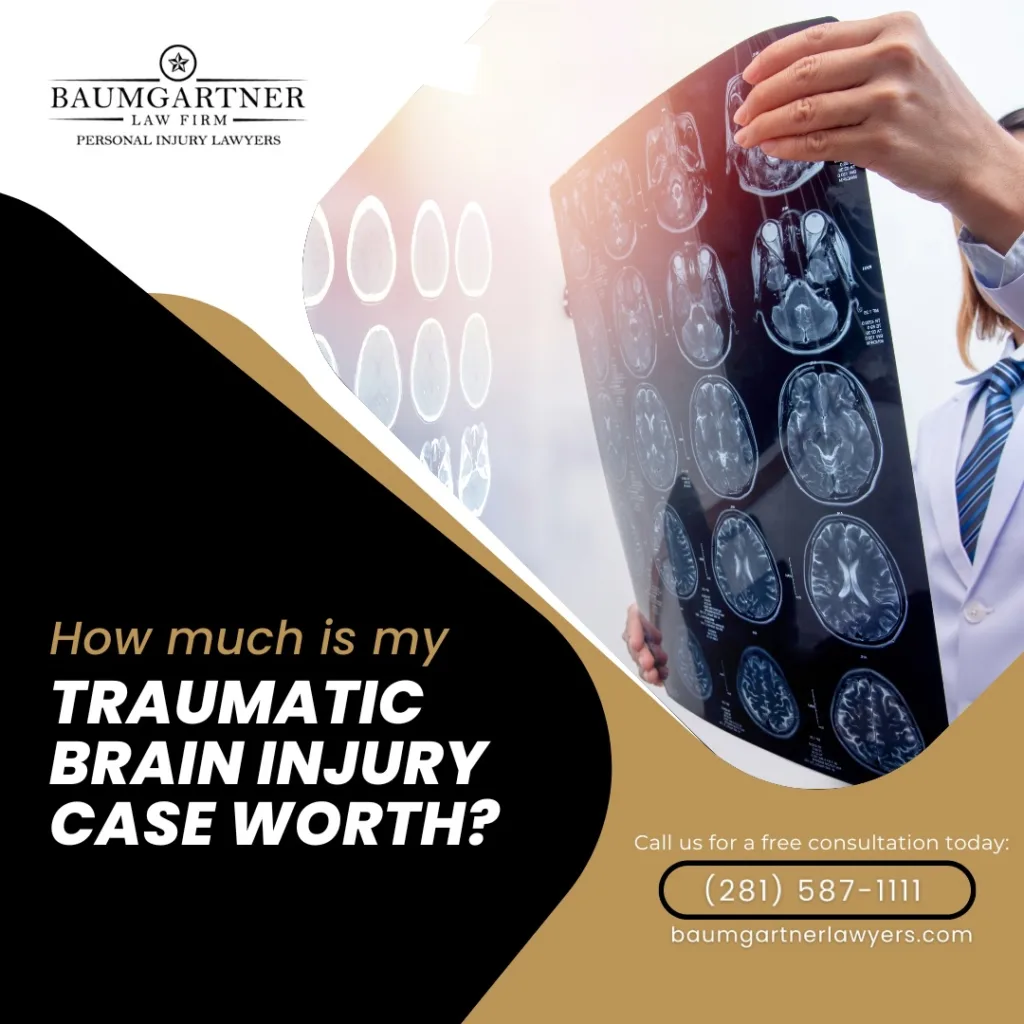
Appropriate compensation may cover some of the following:
Call Baumgartner Law Firm and we will evaluate your head injury case and give you our opinion on how much your case may be worth.
Call us now for a FREE CONSULTATION!
You should discuss your legal options with a head trauma attorney if you have suffered a head or brain injury in a car accident due to someone else’s negligence. Negligence means that someone owed a legal duty of care, breached that duty of care, and as a result, the victim suffered an injury, and the breach of care caused the injury. The victim must prove negligence to win their case.
The consequences of a brain injury can take a painfully personal and financial toll on the injured person and their family. Motor vehicle accidents are a leading cause of traumatic brain injuries. Many brain injury victims are severely injured and may suffer a permanent disability.
Depending on the nature and extent of the injury, victims may need expensive medical care and assistance with everyday activities. Each situation is unique, and life-long medical costs can cost millions of dollars.
Because head and brain injuries are often devastating, greater compensation may be needed. Speaking with a Houston brain injury lawyer is important after an accident.
In Texas, damages are divided into two categories: special and general. Our law firm has filed a personal injury lawsuit for severely injured victims in Houston for over three decades, including Spring, Cypress, The Woodlands, and Conroe. Let us help your family!
Discuss the extent of your damages and the types you may recover with a leading Houston head injury attorney, as the damages recoverable will vary on a case-by-case basis.
We have helped many victims get multi-million dollar settlements after a head injury accident. Call an experienced brain injury lawyer in Houston a Free Case Evaluation.
Baumgartner Law Firm
6711 Cypress Creek Pkwy
Houston, Texas 77069
(281) 587-1111

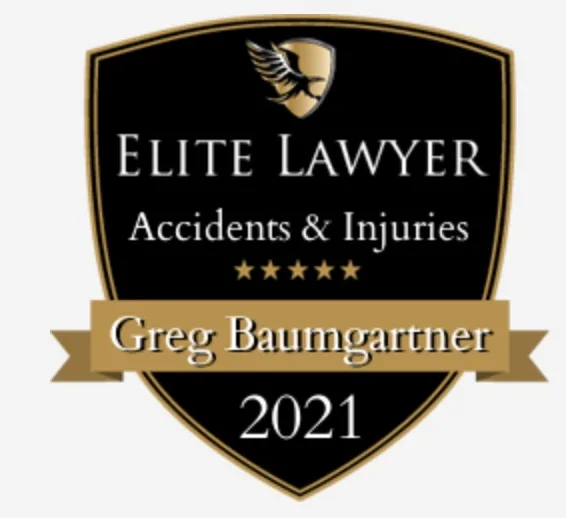

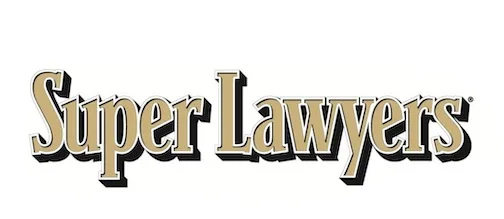



NEED HELP? HAVE QUESTIONS?